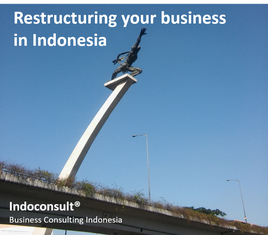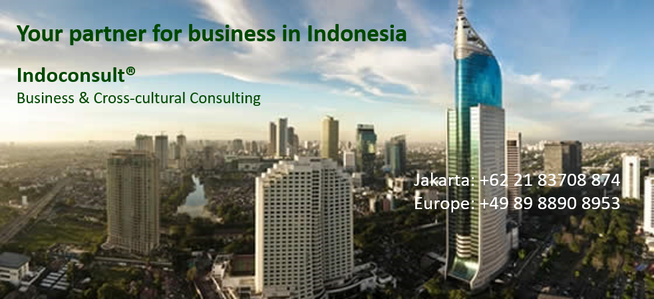
It’s a fact: Many companies operating in Indonesia are having legal structures which are not sustainable on a long-term or which may have negative influence into operations and the business. A typical structure is that a local shareholder involved (either as a nominee or as a partner) in business.
Of course, this might make sense in case of having a “real” local partner, which is many times essential to run business in Indonesia. But in most of the cases the local partner was long, long time ago involved to get better market access, meet regulatory requirements or because it was necessary at that time to get a business license for foreign investment.
It might be time to reconsider your business structure in Indonesia and look out for alternatives.
Things have changed in Indonesia
Indonesia made some big steps towards market access within the last years in regards to Foreign Investment, thus your legal structure might be outdated and there can be better solutions for you available. Or it might be desired to gain more control over the company or simply get a more secure legal standing in Indonesia.
But there are also other reasons to go for a restructuring of your business. One of the most frequent demands might be that your local partner does not deliver anything towards your business, being a nominee only (which is by the way not really a legal solution in Indonesia – we will talk more about this later) or simply does hinder your business more than supporting it (e.g. by negatively involving into operations, not being available to sign documents, etc.).
The basic problem is that in Indonesia a limited liability company (PT) must have two shareholders. In case of a foreign invested company (PT PMA) there might be a regulatory demand to involve a local shareholder to meet the requirements of the so-called “Negative Investment List”. If you are operating in certain business fields this means that a local shareholder must hold some certain percentage of the company shares (starting from 1% up to 99%) in order to obtain the approval to invest in certain business sectors.
Necessity to restructure

One of the most popular reasons to restructure is that foreign investors want to increase their share portion of the company in order to have more direct control. In the past, many business lines have been either fully or partially restricted to foreign investors so that many companies operate in Indonesia with a company involving a local shareholder, which sometimes holds the majority of the company and is having a strong influence towards the legal structure.
Recent changes in the negative investment list, together with an ongoing liberalization and market opening open new possibilities to engage more in local business and gain either majority share hold or even making it possible to obtain a 100% ownership by foreign investor in Indonesia. It is definitely worth to take a look at the current regulations and to compare them with your company structure. There are several business lines which are now fully open or where foreigners can get a majority ownership (i.e. Management Consulting business is now open for 100% FDI, Logistics with 67% FDI).
Another major issue is that it is still very common to have a local nominee in Indonesia, who is holding parts of the company shares due to previous regulations and laws. Those nominee constellations are legal very doubtful and do not give real security to foreign investors.
The fact is that the constellation of having a nominee is indeed very common, but not backed by Indonesian law. Many of the contracts and nominee agreements are purely written in the English language which makes them void in case of a legal trial in Indonesia.
Even if the contracts are construed under another jurisdiction (e.g. Singapore, Switzerland) it is not possible to enforce foreign court rulings and judgements in Indonesia, which makes the nominee agreements useless in case of legal conflicts.
The nominee risk

Nominee agreements will also become more unpopular among Indonesian nominees in the next years as far as they bear an uncertainty in regards to taxation. There are certain tax risks arising from such contracts for both, the nominee and the nominator.
A nominee would need to disclose the agreement to the tax authorities because he/she received a passive income in the form of a trust loan. The lack of a trust law in Indonesia covering this loan would make the money taxable as income as per the date the agreement was signed. If this signing was made way in the past the tax authorities would be allowed to charge penalties and late payment interest on the amount.
In many nominee agreements, there is also a certain compensation agreed which the nominee shall receive on a monthly, yearly or one-time payment basis. This money has to be declared as an active income of the nominee and will be taxable in Indonesia. Theoretically the nominator, if being a registered tax payer in Indonesia could be forced to withhold such taxes on behalf of the nominee and declare them in the tax return. Practically tax authorities have not picked up on this yet, but it is a matter of time until local tax officers will see this a source of increasing the tax intake.
For the nominator the tax consequences are not that dramatic as for the nominee, but there is some kind of tax exposure as well. If the nominator has agreed to any kind of re-payment for the loan those payments would be taxable in Indonesia. The so-called “Pledge of Shares” agreement would indicate that a nominator is tax-vice engaged in Indonesia without having a legal tax registration. Tax officials could raise claims for tax filing and force a tax registration in Indonesia with unpredictable consequences for the nominator.
Optimization of tax exposure is another important topic which might make a restructuring necessary. The ASEAN-Community has implemented some bilateral agreements in the recent years, which open better investment opportunities, tax facilities, ease of licensing for business between its members. If you have a subsidiary in one other ASEAN country, it might be interesting to take a look on the optimization potential when involving them in your Indonesia business.
Some questions can be asked to find out if a restructuring might be a good approach for your business:
- Is my engagement in Indonesia now open for more foreign ownership?
- Is my local partner still reliable?
- Do I want to have a local partner in my business or run it fully myself?
- Is there a chance to optimize my national and international tax exposure and reduce taxes?
- Do I want to increase or decrease my share on the Indonesian market?
- Do I still work with a nominee structure which might be a legal exposure?
- Did I recently setup affiliate companies in any ASEAN country?
- Is my local partner able / willing to engage on a long-term? (step out, reliability, reputation, market access, heredity)
Last but not least a serious international company investing in Indonesia will comply with laws and regulations due to compliance regulations in the home country and business ethics. Trying to find a work around on Indonesian laws draws a bad picture and has uncertain legal and reputation exposures to an international corporation. And as good corporate citizen companies should always act in accordance with the laws and regulations of a market they are engaging in.
Ways to restructure

Indonesia is not offering many opportunities for restructuring because of a lack of legal structures for foreigner to engage in Indonesia.
There is basically only one form of engagement possible for FDI’s which is the so-called PT (Perseroan Terbatas), with its amendment of a PMA (Penanam Modal Asing – Foreign Invested Company), a kind of limited liability company. This company is based on shares., having at least two shareholders, must have a board of directors, a board of commissionaires and a certain amount of capital to incorporate.
The company can become a stock listed company under certain conditions and can be listed on the Indonesian stock exchange (Bursa Efek) in Jakarta. Other forms such as a partnership, limited partnership, trading company or a combination of incorporation forms are only accessible for Indonesian nationals and thus make the possibilities for restructuring has very limited for foreign investors. A merger between a foreign company and a local company is generally not possible in Indonesia unless the foreigner does have already a foreign invested company in Indonesia.
Another regulation is limiting the restructuring possibilities in Indonesia, which is the principle that all existing local companies being affiliated (even with minority share hold) to a PT PMA company have to change their status of a local invested company (PT PMDN) into a foreign invested company (PT PMA) by following all the necessary approval and registration processes. This inherent principle can cause a lot of administrative work and comes with intensive capital injections into existing subsidiaries.
Despite those limited possibilities there are still some ways, which can be utilized to improve the business structure in Indonesia and get the desired results.
The first choice is the exchange of shareholders in order to optimize tax exposure, obtain legal security and intensify the involvement inthe company. Changing the shareholders might look easy and simple, but sometimes can have a real big impact to operations and management. An exchange of a local shareholder with a foreign shareholder for example will increase the engagement possibilities in local business, but trigger some certain legal and registration work to be accomplished.
From investment clearance by the Indonesian investment authority up with changes in business license, to name only a few, have to be planned, structured and executed. It is indeed some work, but might be worth it to achieve the desired result.
What else do you need to consider?

Of course you will be looking for a solution to restructure your business in terms of company ownership and shares but there are a few important things you need to take care about.
Every restructuring activity will trigger labor issues.
The Indonesian labor law is one of the most strict labor laws in Southeast Asia and can easily become a catch when doing restructuring. Depending on the desired result of the restructuring (formation of a new company, increase of shares in the current company) there are several employee related issues.
Employees might have rights for compensation when a company is changing its shareholders and the transfer of employees has to be regulated in advance to every restructuring. Don’t take this issue to easy because employees and labor unions have a big power in Indonesia and can easily put some big stones in your way. We recommend to get all those issues checked in advance by a consultant and a lawyer to be on the safe side.
Another important topic comes when a 100% locally owned company is changing into a PT PMA. You will have to deal with different tax office and the investment authority. As a foreign invested company you will be exposed to higher attention of local authorities in regards to compliance works, accounting standards, HR regulations and so forth. All of this needs to be prepared probably to avoid problems in the future. It is not like you will have to pay more taxes, but you will need to put more effort into your tax compliance and be prepared for audits and investigations by tax officials.
Last but not least the corporate culture needs to be considered. A pure Indonesian company is having different leadership styles, hierarchy levels and a different team spirit. When putting foreigners into managing positions you will need to prepare them and the local team members on those cultural changes.
Finally some direct advertisement:

Indoconsult can be a perfect partner for your restructuring project in Indonesia. We have several years of experience in management and business consulting combined with legal expertise and tax know-how in Indonesia and internationally.
Our consultants have served local and international companies in complex management strategies, executing and optimizing operations and finding solutions for their business.
We are specialized in supporting foreign investors when doing business and Indonesia, have set up several companies for international firms, helped to restructure local business and transform them into International Corporation and managed this, in accordance to our clients quite well (to say excellent would be a little conceited). Our clients have been accompanied from the very first idea up to finalize their projects and even beyond. If you would like to find out more about your opportunities for restructuring, we are happy to answer your questions.
If you would like to engage us for your upcoming projects we would be even happier.
Want to know more about restructuring in Indonesia? Contact us...
Want to download this article?

